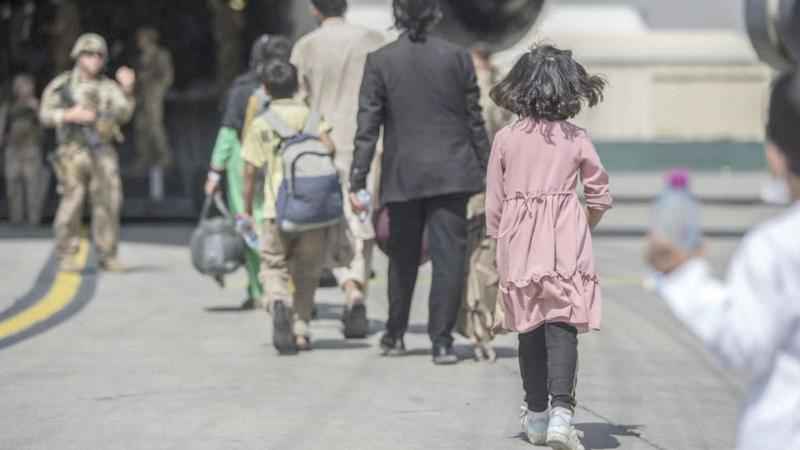‘Starting from zero’: Afghan refugees begin new life in Minnesota
[anvplayer video=”5078315″ station=”998122″]
In a Bloomington apartment, a small group of Afghan men gathered together on a chilly evening, sharing tea, dates and conversation.
"All the refugees, they’re just starting from zero right now," says a 32-year old man, who doesn’t want his name used. "Right now we don’t have a job. As soon as we get a job, I’m going to try to work for a couple of years, and after that, go into business."
These periodic get-togethers are a world away from Taliban rule in Afghanistan.
"The situation there is not good for us," declares a 22-year-old Afghan man, who also wants to remain anonymous.
KSTP asked the man, who arrived in the U.S. three months ago, if he wants to make a home in Minnesota.

[KSTP-TV]
"Yes, I want to live here with my family," he says. "I want to get my education first, then after that, I would like to help my family, my brothers with their business… like in a store or retail.”
For now, this apartment is home for four Afghan men: Refugees from their own country, starting new lives in Minnesota.
"It was kind of hard in the beginning, but now they’re kind of getting used to everything," says Rizwan Qazizada, 29, who moved here from Afghanistan in 2014. "So many new people arrived from different camps, and we’re also helping them at the same time."
5 EYEWITNESS NEWS first reported about Qazizada in October, when he was among the volunteers at Hometown Church in Bloomington, packing supplies for Afghan refugees at Fort McCoy.
Now he’s trying to help recent arrivals adjust to their new homes in the metro.
"I feel so proud to help these people," he said at the time. "I worked with the U.S. military as an interpreter in the past, from 2011 to 2014."
The latest numbers from the Department of Human Services show 438 Afghan refugees have arrived in Minnesota since the end of September.
DHS says over half those arrivals are 18-years-old or younger.
"We didn’t bring anything but ourselves," the 32-year-old man recalls. "Clothes and money and stuff like that. Everything was left behind. We just come in one pair of clothes and a pair of shoes — that’s it."
Qazizada says he returned to Kabul in August, when his wife was granted a visa, after a four-year wait.
During the frantic evacuation effort, he says he was able to get her and their 19-month old daughter Hajira out of the country aboard a military transport.
Getting them safely to Minnesota was a relief, Qazizata explains.
But even before that, there was a huge adjustment, he says.
"I was shocked when I first came to the U.S., the living situation in the U.S. is totally different in than from Afghanistan," he notes. "My family was back home and I was always thinking about them. But now I have my family back here, it’s very easy for me and it’s very nice to have them here."
Qazizada is now living in Apple Valley, working with his brother at Mall of America.
Their families — including five children — share a home.
"We moved to a house, the main reason was the kids," he says. So we have plenty of room and more space for the kids, so they can play. Once in a week, we get together and like have some parties and the families are getting together and the kids, they play together, which is really good."
He’s also trying to help more new arrivals, who share his concerns about family members still in Afghanistan.
Qazizada has 16 relatives who are still there.
He says people are fleeing for their lives, away from the Taliban and other groups.
"They are actually [moving] to different states, so they cannot be recognized or tracked by the Taliban," he notes. "Some people, they choose to stay at their own house, but they are worried to come outside, because they are scared, because some people have been killed recently."
The 32-year-old man who spoke with 5 EYEWITNESS NEWS says his wife and six children remain in Afghanistan and are struggling to get visas to leave.
"Right now, the U.S. doesn’t have an embassy there," he says. "All the families, they couldn’t get out from Afghanistan. They don’t have a flight."
"It’s really hard right now to get a passport from the government… because their systems are down, and the people are new, so they don’t know what to do," Qazizada adds. "There are like thousands of people requesting passports every day, so they cannot reach out to everybody."
Even those who get to the U.S. safely face many new challenges.
Finding a place to live, getting food, securing a job, even obtaining proper winter clothing, are among the most urgent needs.
The 23-year old man says he has hope.
"I like Minnesota," he declares. "I prefer to live in a cold place than a hot place, and I like the people here."
As he helps others, Qazizada is thinking about the future — including the idea of opening up a restaurant.
He has high hopes for the next generation, including his daughter.
"I hope she can go to school here, she can study and she can do something for her country, and she can make a difference. That’s what I hope for her," he says. "My hope is she can get an education and she can use that education in the U.S., and if it’s needed she can use it in Afghanistan as well."